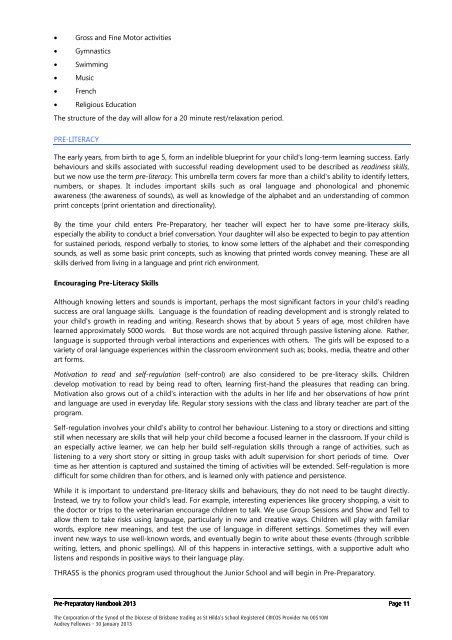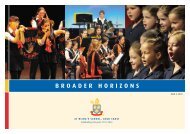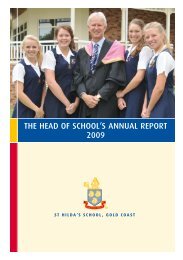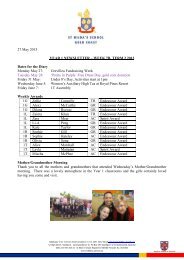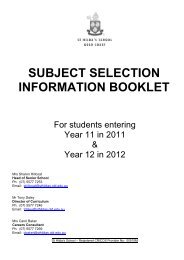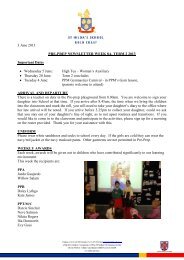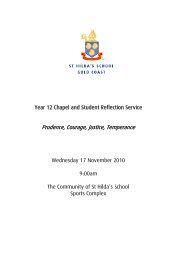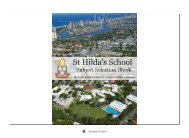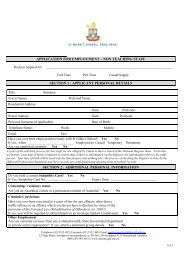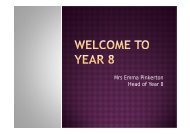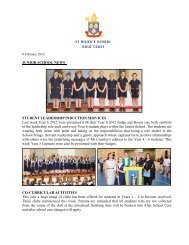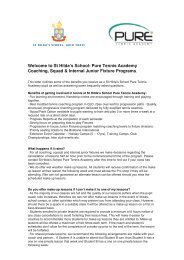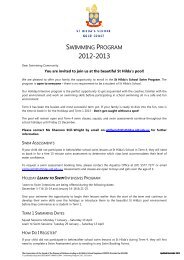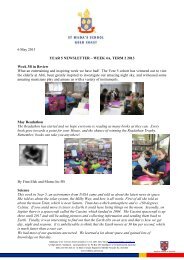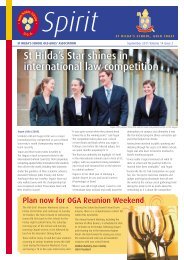Pre Prep Parent Handbook 2013 v9 - 31 January ... - St Hildas School
Pre Prep Parent Handbook 2013 v9 - 31 January ... - St Hildas School
Pre Prep Parent Handbook 2013 v9 - 31 January ... - St Hildas School
Create successful ePaper yourself
Turn your PDF publications into a flip-book with our unique Google optimized e-Paper software.
• Gross and Fine Motor activities<br />
• Gymnastics<br />
• Swimming<br />
• Music<br />
• French<br />
• Religious Education<br />
The structure of the day will allow for a 20 minute rest/relaxation period.<br />
PRE-LITERACY<br />
The early years, from birth to age 5, form an indelible blueprint for your child's long-term learning success. Early<br />
behaviours and skills associated with successful reading development used to be described as readiness skills,<br />
but we now use the term pre-literacy. This umbrella term covers far more than a child's ability to identify letters,<br />
numbers, or shapes. It includes important skills such as oral language and phonological and phonemic<br />
awareness (the awareness of sounds), as well as knowledge of the alphabet and an understanding of common<br />
print concepts (print orientation and directionality).<br />
By the time your child enters <strong>Pre</strong>-<strong>Pre</strong>paratory, her teacher will expect her to have some pre-literacy skills,<br />
especially the ability to conduct a brief conversation. Your daughter will also be expected to begin to pay attention<br />
for sustained periods, respond verbally to stories, to know some letters of the alphabet and their corresponding<br />
sounds, as well as some basic print concepts, such as knowing that printed words convey meaning. These are all<br />
skills derived from living in a language and print rich environment.<br />
Encouraging <strong>Pre</strong>-Literacy Skills<br />
Although knowing letters and sounds is important, perhaps the most significant factors in your child's reading<br />
success are oral language skills. Language is the foundation of reading development and is strongly related to<br />
your child's growth in reading and writing. Research shows that by about 5 years of age, most children have<br />
learned approximately 5000 words. But those words are not acquired through passive listening alone. Rather,<br />
language is supported through verbal interactions and experiences with others. The girls will be exposed to a<br />
variety of oral language experiences within the classroom environment such as; books, media, theatre and other<br />
art forms.<br />
Motivation to read and self-regulation (self-control) are also considered to be pre-literacy skills. Children<br />
develop motivation to read by being read to often, learning first-hand the pleasures that reading can bring.<br />
Motivation also grows out of a child's interaction with the adults in her life and her observations of how print<br />
and language are used in everyday life. Regular story sessions with the class and library teacher are part of the<br />
program.<br />
Self-regulation involves your child's ability to control her behaviour. Listening to a story or directions and sitting<br />
still when necessary are skills that will help your child become a focused learner in the classroom. If your child is<br />
an especially active learner, we can help her build self-regulation skills through a range of activities, such as<br />
listening to a very short story or sitting in group tasks with adult supervision for short periods of time. Over<br />
time as her attention is captured and sustained the timing of activities will be extended. Self-regulation is more<br />
difficult for some children than for others, and is learned only with patience and persistence.<br />
While it is important to understand pre-literacy skills and behaviours, they do not need to be taught directly.<br />
Instead, we try to follow your child's lead. For example, interesting experiences like grocery shopping, a visit to<br />
the doctor or trips to the veterinarian encourage children to talk. We use Group Sessions and Show and Tell to<br />
allow them to take risks using language, particularly in new and creative ways. Children will play with familiar<br />
words, explore new meanings, and test the use of language in different settings. Sometimes they will even<br />
invent new ways to use well-known words, and eventually begin to write about these events (through scribble<br />
writing, letters, and phonic spellings). All of this happens in interactive settings, with a supportive adult who<br />
listens and responds in positive ways to their language play.<br />
THRASS is the phonics program used throughout the Junior <strong>School</strong> and will begin in <strong>Pre</strong>-<strong>Pre</strong>paratory.<br />
<strong>Pre</strong>-<strong>Pre</strong>paratory <strong>Pre</strong>paratory <strong>Handbook</strong> <strong>2013</strong><br />
Page 11<br />
The Corporation of the Synod of the Diocese of Brisbane trading as <strong>St</strong> Hilda’s <strong>School</strong> Registered CRICOS Provider No 00510M<br />
Audrey Fellowes – 30 <strong>January</strong> <strong>2013</strong>


